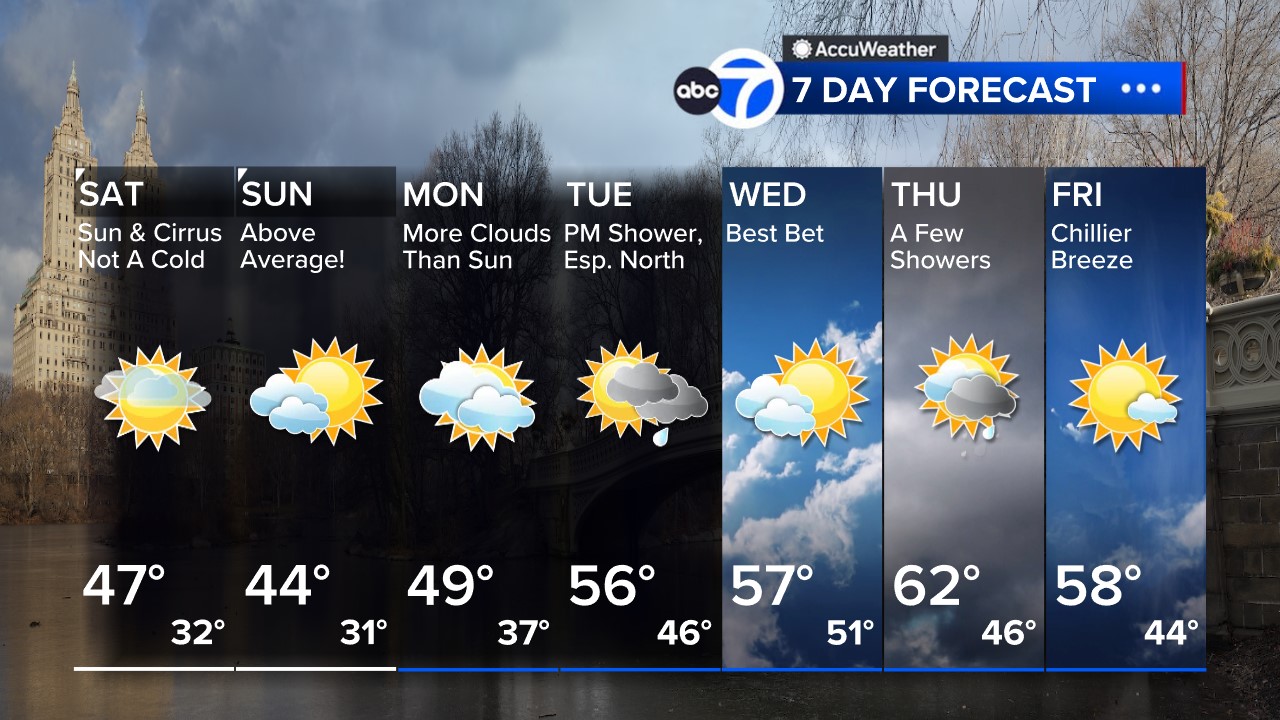Precautions urged as extremely cold weather grips New York area
AccuWeather forecast for NYC, New York, New Jersey and Connecticut

NEW YORK (WABC) -- Extremely cold weather is gripping the New York area, and residents are urged to take precautions to stay safe.
Gusty winds and frigid temperatures are bringing sub-zero wind chills through much of the weekend.
"Stay indoors as much as possible and bundle up if you have to go out," NYC Emergency Management Commissioner Deanne Criswell said. "Remember to virtually check in on your friends, family or neighbors who may be most vulnerable to the extreme cold.'
AccuWeather Alert: Arctic blast may be followed by a big snowstorm
Prolonged exposure to cold can lead to frostbite, which often results in red and painful or pale skin, and hypothermia.
Symptoms of hypothermia include intense shivering, dizziness, trouble speaking, lack of coordination, sluggishness or drowsiness, confusion or shallow breathing.
If you see symptoms of hypothermia or frostbite, call 911 and follow instructions, or go to the emergency room.
"Call 311 if your heat at home isn't working," Health Commissioner Dr. Dave Chokshi said. "New Yorkers should also call 311 if they see someone outdoors who appears to be experiencing homelessness."
During a Code Blue Weather Emergency, which is when the temperature or wind chill is forecast to drop to 32 degrees Fahrenheit between 4 p.m. and 8 a.m., no one who is homeless and seeking shelter in New York City will be denied.
Building owners are legally required to provide heat and hot water to their tenants.

The city provided the following winter weather heating tips in case residents lose heat or power:
Insulate your home as much as possible. Hang blankets over windows and doorways and stay in a well-insulated room while heat or power is out.
- If you use an electric space heater, plug it directly into the wall. Do not use an extension cord. Place it away from flammable items including clothing.
- Dress warmly. Wear hats, scarves, gloves, and layered clothing.
- For working fireplaces, use them for heat and light, but be sure to keep the damper open for ventilation.
- Open your faucets to a steady drip so pipes do not freeze.
- Improper use of portable heating equipment can lead to fire or dangerous levels of carbon monoxide. Take precautions to ensure you are heating your home safely and make sure you have a working carbon monoxide detector. Do not heat your home with a gas stove or oven, charcoal grill, or kerosene, propane, or oil-burning heaters.
Other cold weather tips:
- During cold weather, wear dry, warm clothing and cover exposed skin. Keep fingertips, earlobes, and noses covered. Wear a hat, hood, scarf, and gloves. Stay alert for signs of hypothermia, like intense shivering or dizziness, and anyone who experiences these symptoms should seek medical attention or call 911.
- Check on family, friends and neighbors who may need help in cold weather - especially older adults or people with disabilities - to make sure they are safe inside and have heat.
- Immediately tell your building superintendent, property manager or owner if you do not have heat. Call 311 if the problem is not fixed quickly and go to a warm place, such as a friend or family member's home (while maintaining proper physical distance and wearing a face mask). If you stay at home, wear layers of clothing.
- Eat. Food provides your body with energy to produce heat and drinking helps you avoid dehydration.
Check the latest alerts and advisories for the New York area from the National Weather Service
For weather updates wherever you go, please download the AccuWeather app.












